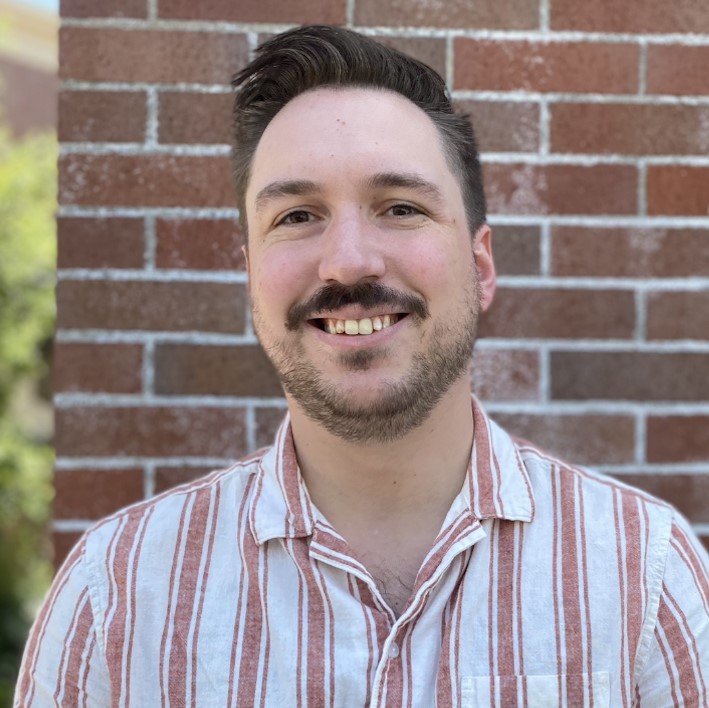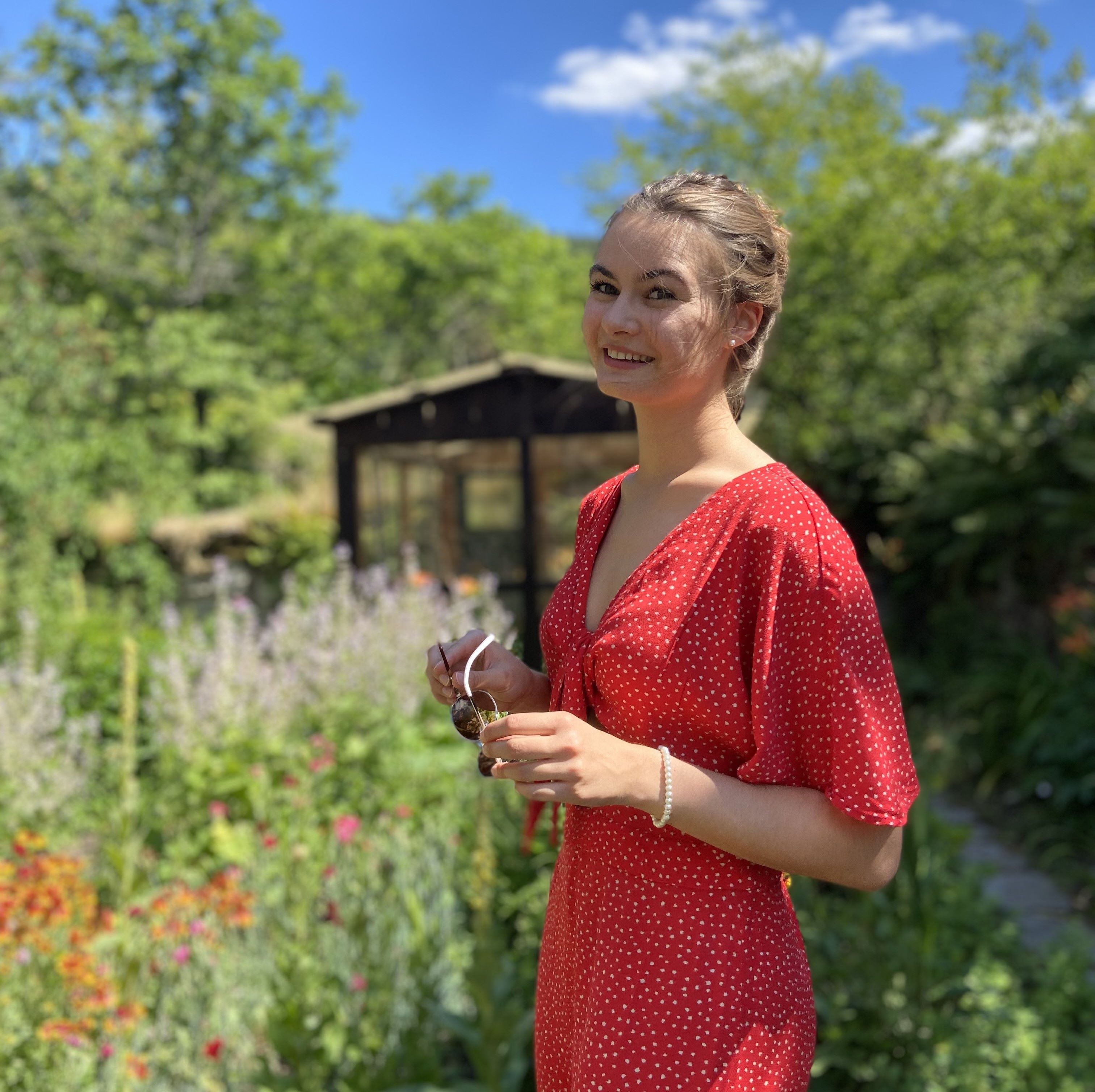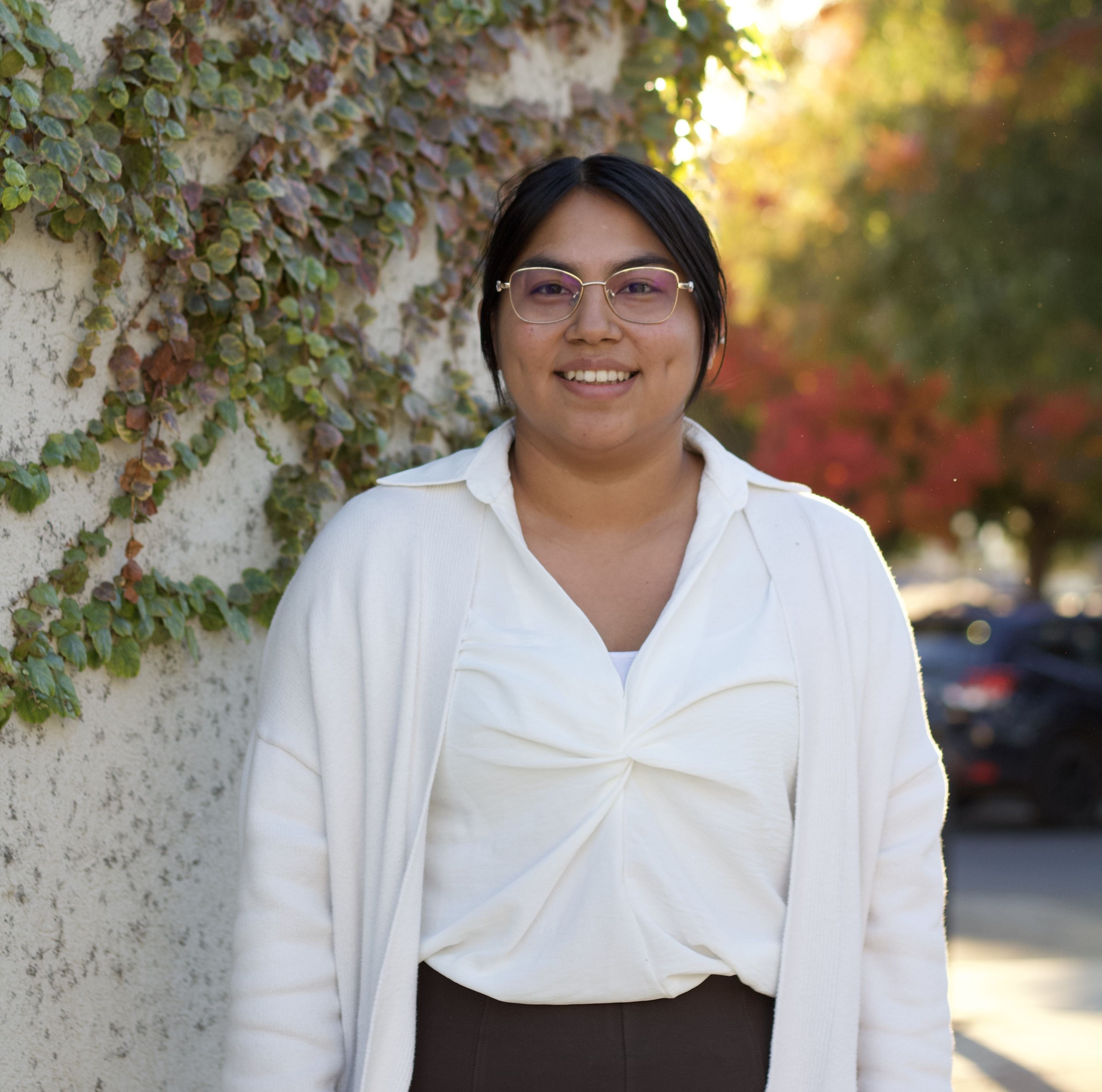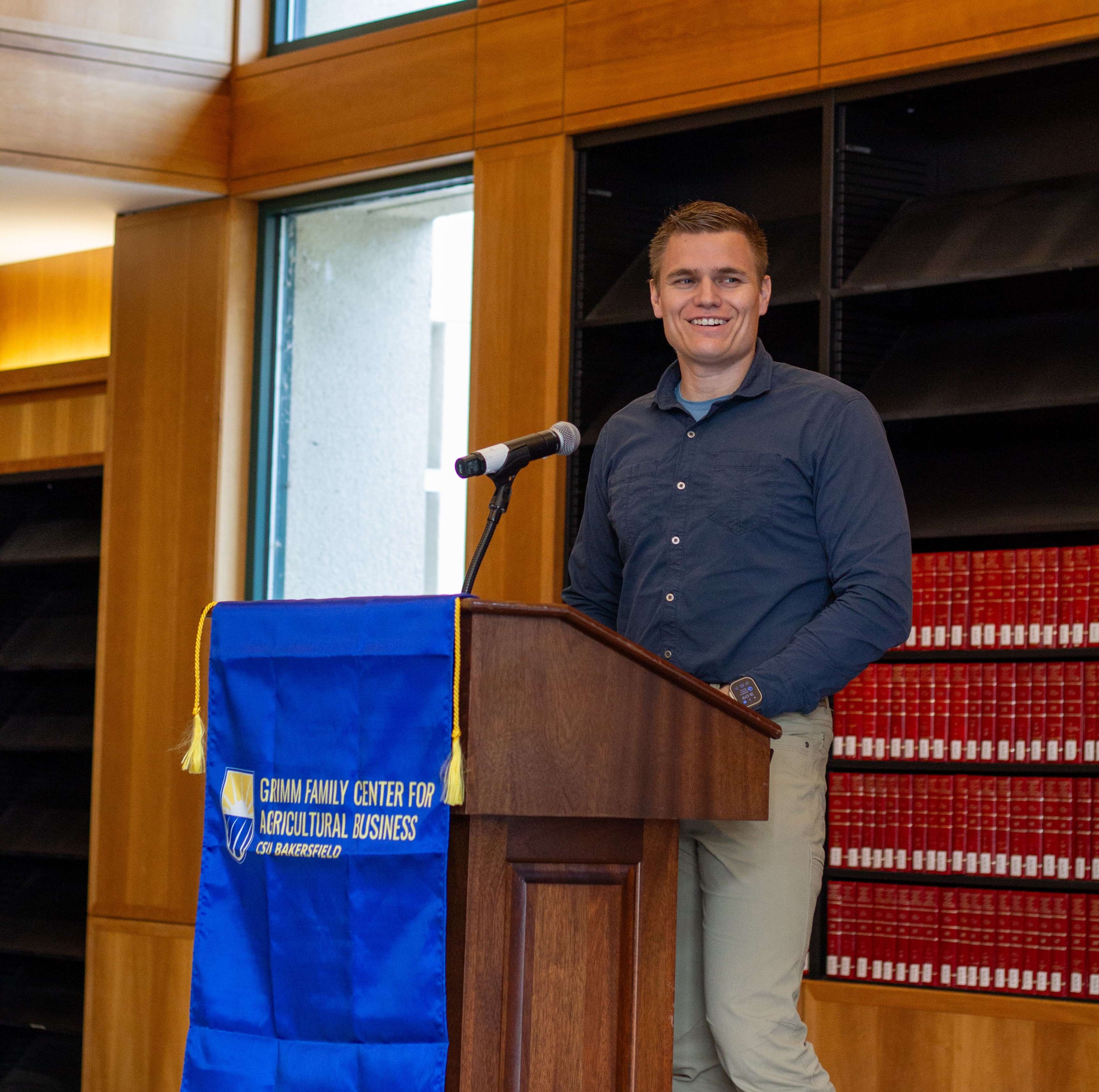2023-2024 student research scholars
On November 17, 2023, The Grimm Family Center for Agricultural Business at California State University, Bakersfield hosted their first annual Student Research Symposium in the Dezember Reading Room of the Walter W. Stiern Library. The Student Research Symposium provided six students the opportunity to present their current research relating to the topic of agriculture. The Grimm Family Center for Agricultural Business selected the six students based on applications and recommendations from CSUB faculty. This year’s cohort included the following students: Isabel Flores Hernandez, Mathilda Nordhaus, Fiya Grace Manoj, TJ Moreno, Gabriel Moore, Zachary Powell.
Access full press release here.
Gabriel Moore

Gabe Moore began researching Kern County’s Chinese American history in the Fall of
2022, as an undergraduate student at California State University, Bakersfield. In conducting this research, Gabe has utilized numerous archives to gather information
pertaining to this overlooked community in the hopes of providing a systematic and
realistic depiction of the region's Chinese American history. This research has delved
into topics surrounding ethnic enclaves, anti-Chinese discrimination, and, notably,
the impact Chinese individuals have had on Kern County's agricultural industries.
While Gabe graduated in the Spring of 2024, he will be continuing his studies and
research as a Graduate student at CSUB beginning in the Fall of 2024.
In his presentation titled Locating Local History: Chinese Agriculture in the Archives, Gabe Moore provided a glimpse into his ongoing research surrounding the historical
impact Kern County's Chinese community has had on the region's agricultural foundations
and development, while simultaneously showcasing the process, difficulties, and importance
of conducting historical research.
Link to Presentation: Locating Local History.pdf | Powered by Box
Tj Moreno

TJ Moreno is an undergraduate student at California State University, Bakersfield
working towards his B.S. in Biology with a strong interest in wildlife biology and
conservation. Moreno’s academic path is focused on understanding and preserving ecosystems,
with plans to pursue an M.S. in Biology. Beyond academics, Moreno enjoys exploring
nature through activities like hiking, camping, and fishing.
In his presentation, Biocontrol of Southern blight by Streptomyces species isolated from Kern County, Moreno aimed to provide sustainable solutions to improve tomato crop resilience
and productivity. At the Dr. Isolde Francis Plant-Microbe Interaction Lab, Moreno’s
research focused on combating Southern Blight, a destructive disease affecting California’s
processing tomato industry. Moreno investigated the potential of locally isolated
Streptomyces strains as natural biocontrol agents against the pathogenic fungus Sclerotium rolfsii. Through his rigorous laboratory work, Moreno aimed to identify effective strains
that inhibit fungal growth, survive in diverse soils, and protect tomato plants.
Link to Presentation: Presentation
Mathilda Nordhaus

Nordhaus’s research targeted the German agriculture and its prospects under the influence of modern challenges like the climate change and the COVID19 pandemic. The statistics of field crops and livestock by area followed a brief discussion about the prerequisites of the location and geography of the country for farming. In a comparison between Napa Valley (USA) and the Rhine region (Germany), the differences and similarities of local viticulture was underlined. Nordhaus’s presentation especially highlighted the obstacles in contemporary farming methods and pointed out the prospects.
Link to Presentation: Prospects of German Agriculture
Isabel Flores Hernandez

Isabel Flores Hernandez graduated from California State University, Bakersfield with
a bachelor’s degree in political science. During her undergraduate studies, Hernandez
completed her major with an emphasis in Pre-law and Power and Justice in Spring 2024.
In her presentation titled restoring a Reappearing Tulare Lake: A Case for Eminent Domain, Isabel Flores Hernandez researched the concerns of the State of California’s right
to exercise Eminent Domain over property residing on the Tulare Lake basin for the
restoration of the lake. Hernandez sought to analyze whether the state of California
has the constitutional authority to seize the property and on what grounds. Hernandez
analyzed several reasonings the state has for the restoration of the lake: (1) address
the water shortage issue in California, (2) environmental protection, and (3) to do
away with unsustainable and expensive alternatives like wastewater treatment plants
and desalination plants, that California is currently employing. Moreover, Hernandez
also addressed the implications that come with the restoration of the lake: impact
of the state’s economy and global market.
Link to Presentation: Research Project Presentation.pptx | Powered by Box
Fiya Grace Manoj

Fiya Grace Manoj is an undergraduate student working towards her B.S. in Biology with
a minor in Chemistry at California State University, Bakersfield. Upon graduation,
Manoj hopes to pursue medical school and become a physician. A fun fact about Manoj
is that she has been a Bollywood dancer since the age of eight.
In her presentation titled Role of tad-like loci in the attachment of the plant pathogenic bacterium Rhodococcus fascians to its host, Fiya Grace Manoj explained how the plant pathogenic bacterium Rhodococcus fascians causes significant economic losses, mostly in the ornamentals industry and can infect
an exceptionally broad range of monocotyledonous and dicotyledonous, woody as well
as herbaceous plants. The bacteria cause deformations on the upper part of the plants
by secreting cytokinins (plant hormones) which activate existing and form new meristems
leading to the development of a leafy gall at the site of inoculation. Currently there
is no method for disease management and a better understanding of the bacterial behavior
and virulence strategies would be helpful. One of the first and crucial steps to establish
a successful pathogenic interaction is attachment to the host. Two gene loci with
high homology to tad (tight adherence) loci were identified in the genome of R. fascians strain D188. These loci typically encode macromolecular transport systems required
for the assembly of adhesive pili. These are hair-like extensions on the outside of
the bacterium which aid in their attachment to surfaces, such as a host plant. I am
currently constructing mutants in each of the tad loci to evaluate their attachment efficiency in comparison to the wild-type bacterium
and the effect of these mutations in the overall process of plant pathogenicity by Rhodococcus fascians. The GFCAB funds helped me to pay for gas to drive to campus to do the project and
made feel appreciated as a young researcher.
Link to Presentation: Presentation
Zachary Powell

Zach Powell is a graduate student studying History at California State University,
Bakersfield. Prior to graduate school, Powell received his teaching credential and
Bachelor’s degree from CSUB and his Associates degree in Liberal Arts from San Jose
City College. Powell has received numerous recognitions including the Marshall & Etta
Master’s Scholarship, CSUB’s 2023 Student Research Competition Award, and placed second
for the J.R. Wonderly Memorial Award. Powell is a veteran of the U.S. Army, where
he received the rank of Sergeant as a Deep Sea Diver, and teaches at Ollivier Middle
School in Bakersfield, CA.
In his presentation, Californian Farmers and the Environment: The Conservation Mindset at the Turn of the
Century, Zach Powell set out to discover how late nineteenth century Californian farmers
received John Muir’s preservationist argument that sought as expansion of the national
park system. This grant enabled me to gain access to numerous subscriptions to digital
archives and purchase multiple books, which, combined with the Muir Papers from the
University of the Pacific, made-up the bulk of Powell’s research. Firstly, Muir centered
the majority of his preservationist argument on articulating nature’s beauty to express
the need for its protection. Powell’s research revealed that California farmers were
convinced of the necessity of forest preservation due to their ecological necessity
on waterways, which farmers needed for irrigation downstream. However, once national
parks were established across Sierra Nevada, farmers regularly expressed frustration
for preservation as way to support their livelihood. Preservation was not for tool
to protect nature’s beauty, as Muir argued to the American people in numerous articles,
but financial opportunity. Farmers in the late nineteenth century were extremely exploitative
of the environment, which was further illustrated in their adverse relationship with
creatures that they deemed as pests, particularly squirrels, rabbits, and insect,
which they actively killed with experimental pesticides, various blood sports, shooting.
Muir’s argument that nature should be preserved to protect its beauty did not convince
farmers to establish more national parks. Rather, farmers viewed preservation as a
means to protect and expand financial opportunities.
Link to Presentation: Powell Cal Ag Community Presentation PPT.pptx | Powered by Box